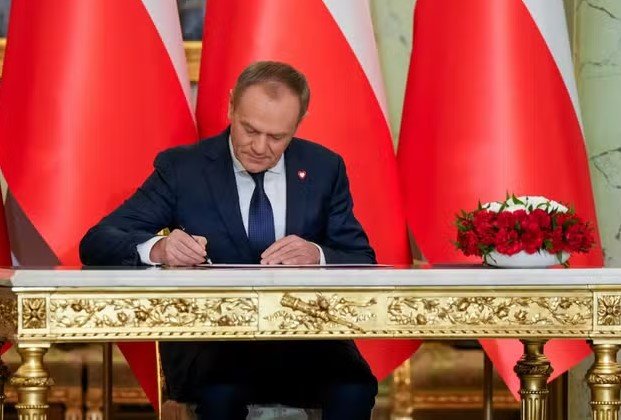Warsaw-Tel Aviv tensions flare as Holocaust-era allusion ignites fury in Jerusalem
Israel has summoned the Polish ambassador for a formal rebuke after Prime Minister Donald Tusk publicly criticized the Israeli government’s conduct in Gaza, comparing it to “the hell of World War II.” The comment, seen by Jerusalem as a veiled Holocaust reference, triggered an immediate diplomatic pushback.
The move adds to a growing rift between Warsaw and Tel Aviv, as international criticism of Israel’s war in Gaza continues to mount.
A sentence that shook the corridors of power
Tusk’s words weren’t shouted. They weren’t even said with fury. But they landed like a slap.
Speaking at a ceremony marking the 85th anniversary of the outbreak of World War II, Tusk said: “We cannot stay silent when politicians’ actions bring hunger and death to mothers and children. We remember the hell of World War II. We must not look away now.”
Israel interpreted that statement as an unmistakable allusion to the Holocaust—invoking a moral equivalence that officials called offensive and historically reckless.
By Tuesday, the Israeli Foreign Ministry summoned Polish Ambassador Maciej Hunia for what insiders described as a stern “dressing down.”
Why Israel took it so personally
For Israel, linking the current Gaza offensive—however controversial—to Holocaust-era suffering is a red line.
A senior Israeli official who requested anonymity said: “This wasn’t just another criticism. It touched on our very identity. You don’t weaponize the memory of Auschwitz to make a political point about a war zone.”

In its public statement, the Foreign Ministry accused Tusk of crossing “a moral boundary” and promoting “a dangerous distortion of history.” The summons was delivered by the head of Israel’s Political-Strategic Division, signaling the seriousness of the response.
The statement didn’t mention the Holocaust directly. But Israeli officials close to the meeting said the reference was “clearly understood and deeply resented.”
Poland’s reaction: measured, not apologetic
So far, Warsaw isn’t backing down.
While Polish officials haven’t responded with the same heat, Tusk’s allies say the prime minister stands by his words. One government spokesperson told local media that Tusk “was speaking from Poland’s long memory of war, suffering, and civilian death.”
They added that the comment was not about the Holocaust per se but about the universal obligation to condemn starvation in wartime—something Poland has witnessed firsthand in its own history.
Here’s what the official Polish line looks like so far:
| Statement Element | Position |
|---|---|
| Comment retraction | No |
| Clarification issued | Not yet |
| Media interviews since backlash | 1 (TVN24) |
| Embassy comment in Tel Aviv | “Not aware of apology” |
So, while both sides are talking, there’s no sign of cooling tension yet.
Global context: Gaza war criticism rising
Tusk isn’t alone.
Israel’s military campaign in Gaza has drawn repeated criticism over civilian casualties and worsening humanitarian conditions. Since the beginning of July, several European leaders—along with UN officials—have described the situation in Rafah and Khan Younis as “unlivable.”
Earlier this week, UN aid agencies said that one in three children under 5 in northern Gaza is acutely malnourished.
That stat has popped up in parliamentary debates across the EU. And it’s feeding political outrage across the globe.
Only last month:
-
Spain and Ireland called for an arms embargo.
-
South Africa filed a second legal brief against Israel at the ICJ.
-
The European Parliament passed a symbolic motion urging “ceasefire with humanitarian guarantees.”
Israel, for its part, insists it is doing everything it can to open aid corridors and prevent civilian harm, despite Hamas’s alleged use of human shields.
The tangled Polish-Israeli past
There’s also a long shadow hanging over this week’s spat: history.
Poland and Israel have clashed before on how the Holocaust is remembered and taught. In 2018, a Polish law criminalizing suggestions of Polish complicity in Nazi crimes caused a diplomatic firestorm. Netanyahu and then-Polish PM Mateusz Morawiecki engaged in bitter exchanges, which took months to settle.
That baggage hasn’t gone away.
“Old wounds resurface easily in Polish-Israeli diplomacy,” said Dr. Yael Hirschhorn, a historian at Hebrew University. “When the Gaza war gets compared to WWII, it’s not just geopolitics—it’s emotional, national identity stuff. And that’s dynamite.”
And this time, it’s a progressive Polish leader doing the talking—not a nationalist, which makes the exchange even more complicated.
What now?
It’s unclear where things go from here.
Israeli diplomats say they hope the Polish side will issue a clarification to calm tempers. But there’s no sign Tusk is walking anything back.
Privately, some in the Israeli coalition are calling for more drastic measures—like freezing bilateral programs or canceling high-level visits. But for now, the official line is watch and wait.
Meanwhile, the war in Gaza grinds on. And with it, the chorus of global leaders speaking out is only growing louder.
